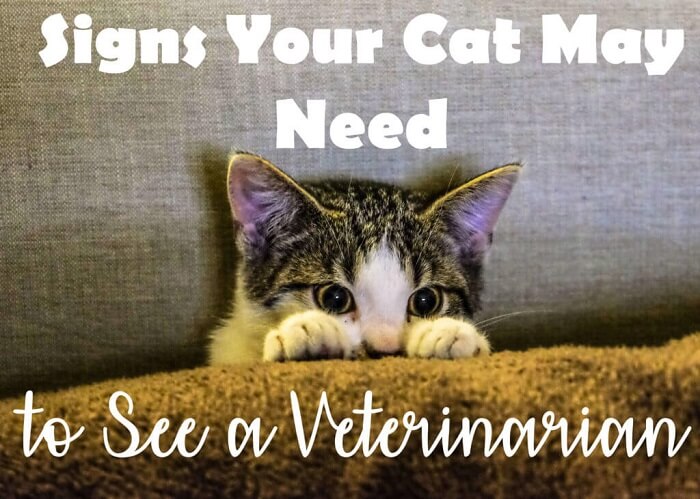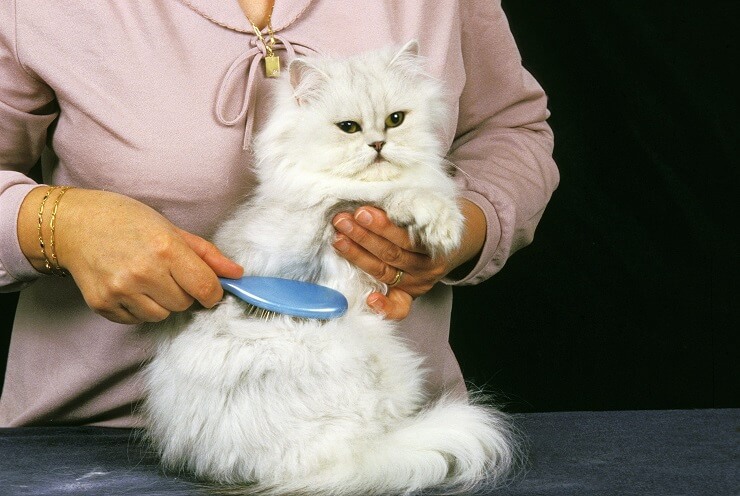Signs Your Cat May Need To See A Veterinarian
This page contains affiliate links. We may earn money or products from the companies mentioned in this post through our independently chosen links, which earn us a commission. Learn More

Most cat owners know their cat needs to visit the veterinarian on a regular basis for routine health care. For most cats, this will probably be once or twice a year. Your veterinarian can easily review your cat’s medical history and advise you when your cat is due for the next visit.
However, many people wonder what types of symptoms should warrant an unplanned trip to the veterinarian. Of course, everyone knows that if the symptoms seem severe or if your cat is bleeding, she should go as soon as possible. But what about the more subtle signs that sometimes occur?
Generally speaking, it’s better to err on the side of caution and schedule an appointment for your cat any time she is acting unusual. As we know, cats are masters at hiding their pain so anything out of the ordinary can be a big deal. But, once you check with reputable cat sources online, like Catpet.club, you’ll be surprised about the many underlying signs that your cat may need to see a vet.
Here are some signs to determine if your cat needs to see a veterinarian sooner than later.
Eating Habits
Specific symptoms which might prompt a visit to the doctor are things like a sudden change in your cat’s appetite. For instance, if you cat suddenly stops eating, there’s probably a reason for that change. Usually, cats will refuse to eat when they don’t feel well. On the other hand, some illnesses may increase a cat’s appetite. A cat’s thirst can also be affected when a cat isn’t feeling her best or has an underlying issue. Suddenly drinking a lot of water may be an indication of diabetes or kidney disease.
Litter Box Habits
Most cat owners, like Jimmie O’Chutt, would attribute the sudden refusal of cats to urinate in their litter box to just a simple behavioral concern. But, it’s actually related to health problems
Check your cat’s litter box regularly to make sure she is urinating and defecating normally. If your cat isn’t using her litter box, has blood in her urine or stool, or has diarrhea accompanied by other signs of illness, she should see a vet. Changes in your cat’s bowels like loose stools, diarrhea, or constipation, may be indications of a gastrointestinal problem, or some other type of illness.
If your cat is making frequent trips to the litter box, strains, cries or appears to be in pain in the litter box, she may have a urinary tract infection or even a blockage. Also urinating or defecating outside the litter box could indicate kidney stones or feline interstitial cystitis, or your cat may simply have arthritis and find climbing into the box painful.
Vomiting
Vomiting can be indicative of many different health problems. If your cat is vomiting repeatedly, if there’s blood in the vomit, or if the vomiting is accompanied by lethargy, your pet should see a veterinarian as soon as possible. If your cat regurgitates food soon after eating, she may have a problem. Vomiting food after it’s been in the stomach can indicate poisoning, blockage or a host of other problems. If your cat vomits for more than a few hours or vomits repeatedly for more than a day, she probably needs to see a vet. If a vomiting episode is accompanied by lethargy, diarrhea or reluctance to move, you should seek medical attention.
Respiratory Issues
Frequent sneezing may indicate a respiratory problem, as well as a runny nose or eyes. Coughing can also point to a respiratory problem, or even a heart problem. Excessive panting or heaving breathing can be indicative of asthma, a respiratory or heart problem, as well.
If your cat has a runny nose, frequently sneezes or coughs or has crusty eyes, she could have a cold or maybe something more serious. Keep your cat’s vaccinations up to date because they help prevent feline viruses. In rare cases your cat could still contract feline herpes or feline calicivirus, and both have symptoms that mimic the common cold, https://suriaplasticsurgery.com/valtrex-valacyclovir/.
If your cat’s symptoms last longer than 7 to 10 days or if the symptoms get worse or if new symptoms appear, take your cat to the veterinarian for a complete medical exam.
Injury
If your cat is limping, is having difficulty going up and down stairs, has difficulty rising from a sleeping position, or seems in overall pain, your cat’s veterinarian should be consulted. These symptoms may indicate a traumatic injury such as a fall, a degenerative type of disease affecting the joints or back, such as arthritis or some other type of musculoskeletal problem.
Scratching
Symptoms such as scratching, hair loss, and reddened skin may indicate skin problems such as allergies or parasitic infections. Likewise, scratching at the ears and shaking the head may indicate an ear problem, as does a discharge or odor from the ears.
Mouth Issues
If your cat seems to have difficulty chewing her food, if you are seeing blood from her mouth or gums, or her mouth seems painful, there may be a dental issue which needs attention.
If you notice a yellow coloration on your cat’s skin or gums, your cat should see the doctor as soon as possible. In addition, if your cat’s gums appear to be pale instead of pink in color, or if the gums look blue or purple in color, your cat needs to see her veterinarian. These changes may indicate serious disease for your cat.
Vaginal Discharge
If you are noticing discharge or bleeding near the vaginal area, your cat should see her veterinarian. Remember, though dogs do bleed when they are “in heat”, cats do not. If you are seeing a vaginal discharge or bleeding from your female cat, it is abnormal and needs to be checked.
Similarly, spayed females do not come into “heat” and should not bleed.
Eye Problems
If your cat’s eye become cloudy, reddened, if she is squinting or rubbing at the eyes, or if there is a discharge from the eyes, your cat should see the veterinarian. Some cats do have allergies, which cause them to have itchy, watery eyes. If your cat has no known allergies, she may have sustained an eye injury, or debris in the eye or has an infection, and should see the vet.
Skin Changes
Most of us spend a great deal of time catting and grooming our cats. It is advisable, while you are doing this, to make note of any lumps or bumps on or underneath your cat’s skin. You should visit your vet for an exam as soon as you notice any abnormality in your pet’s skin, such as excessive hair loss, flaking and scaling, redness and bald patches, or if your pet begins to excessively scratch, lick or bite areas on his fur. Once parasites are ruled out, your vet can test for bacterial infections, food allergies, skin cancers or abscesses.
Conclusion
If your cat just doesn’t seem to be herself, it may or may not be a more serious problem. This is why being tuned in to subtle changes in your cat’s body and behavior is crucial and could save your cat’s life. A good rule of thumb would be to consult your cat’s doctor if you notice anything abnormal in your cat’s behavior, appearance or activities. Many illnesses are much easier to treat if diagnosed early in the course of the disease as opposed to later. If in doubt, have your cat examined by her veterinarian.



